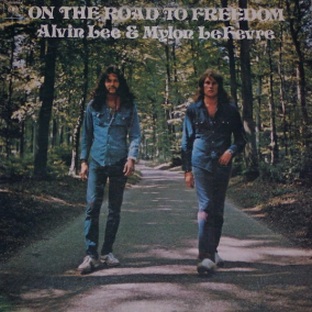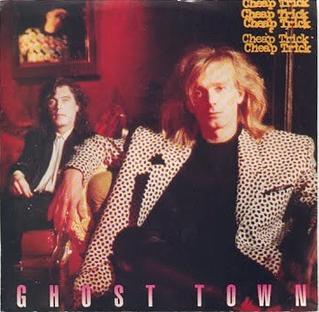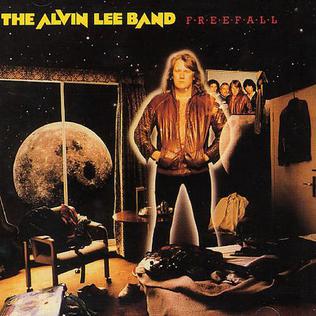
Alvin Lee was an English guitarist, singer and songwriter, who was best known as the lead vocalist and guitarist of the blues rock band Ten Years After.

Daniel Earl Hartman was an American rock musician, multi-instrumentalist, singer, and songwriter and original frontman for several bands, including The Soploids, Mak and the Turnarounds, Our Wringer, Last Wing, and Orion. Among songs he wrote and recorded were "Free Ride" as a member of the Edgar Winter Group, and the solo hits "Relight My Fire", "Instant Replay", "I Can Dream About You", "We Are the Young" and "Second Nature". "I Can Dream About You", his most successful song, reached No. 6 on the Billboard Hot 100 in 1984 and No. 12 on the UK Singles Chart in 1985. The James Brown song "Living in America", which Hartman co-wrote and produced, reached No. 4 on March 1, 1986.

Quinella is the tenth album by American Southern rock band Atlanta Rhythm Section, and their only album on Columbia Records, released in August 1981. The band was supposed to release another album on the label, but due to differences between Columbia and the band, the album was shelved.
Steve Gould is a British singer and musician who was the lead singer and bassist of the late 1960s to mid 1970s London-based progressive rock band, Rare Bird. They had one hit single titled "Sympathy" which peaked at No. 27 in the UK Singles Chart.

"Hard to Say I'm Sorry" is a 1982 power ballad by the group Chicago. It was written by bassist Peter Cetera, who also sang the lead vocals on the track, and producer David Foster. It was released on May 17, 1982, as the lead single from the album Chicago 16. On September 11 it reached No. 1 for two weeks on the Billboard Hot 100. It was the group's second No. 1 single. It was their first top 50 hit since "No Tell Lover" in 1978 and it spent twelve weeks in the top 5 of the Billboard Hot 100. The single was nominated for a Grammy Award for Best Pop Performance by a Duo or Group with Vocal, and was certified gold by the Recording Industry Association of America (RIAA) in September of the same year. Songwriter Cetera, a member of the American Society of Composers, Authors and Publishers (ASCAP), won an ASCAP Pop Music Award for the song in the category, Most Performed Songs.

"After Midnight" is a rock song by J. J. Cale, first released in 1966. Eric Clapton later covered it for his eponymous album, released in 1970. Clapton's rendition became a success, prompting Cale to re-record the song for Cale's 1971 album Naturally. In 1987, Clapton later re-recorded the song for a Michelob beer commercial and then released the re-recording as a single. "After Midnight" has been considered one of Clapton's signature songs throughout his career. Other artists covered the song in later years.

Right or Wrong is the second studio album by American country music singer Rosanne Cash. It was released in September 1979 by Columbia Records.

Boogie with Canned Heat is the second studio album by American blues and rock band Canned Heat. Released in 1968, it contains mostly original material, unlike their debut album. It was the band's most commercially successful album, reaching number 16 in the US and number 5 in the UK.

"Fly Like an Eagle" is a song written by American musician Steve Miller for the album of the same name. The song was released in the United Kingdom in August 1976 and in the United States in December 1976. It went to number two on the US Billboard Hot 100 for the week of March 12, 1977. The single edit can be found on Greatest Hits (1974–1978). It is often played in tandem with "Space Intro". On the album, the song segues into "Wild Mountain Honey".

The Rolling Stones' American Tour 1981 was a concert tour of stadiums and arenas in the United States to promote the album Tattoo You. It was the largest grossing tour of 1981 with $50 million in ticket sales. Roughly 2,5 million concert goers attended the concerts, setting various ticket sales records. The 5 December show in New Orleans set an indoor concert attendance record which stood for 33 years.

Sneakin' Sally Through the Alley is the debut solo album by Robert Palmer, released in 1974. It was his first effort after three album releases co-fronting the band Vinegar Joe.

"Along Comes a Woman" is a song written by Peter Cetera and Mark Goldenberg for the group Chicago and recorded for their album Chicago 17 (1984), with Cetera singing lead vocals. The fourth single released from that album, it is the last Chicago single released with original singer/bassist Cetera, who left the band in the summer of 1985.

On the Road to Freedom is an album by English rock musician Alvin Lee and American gospel singer Mylon LeFevre. Released in November 1973, it was the first solo project by Lee, who had achieved international success through his leadership of the blues rock band Ten Years After. The album was recorded at Lee's home studio in south Oxfordshire, which he and LeFevre built especially for the project. The guest musicians at the sessions included George Harrison, Steve Winwood, Jim Capaldi, Ron Wood and Mick Fleetwood. "Fallen Angel" and the Harrison-composed "So Sad " were issued as singles from the album.

City Lights is an album by Dr. John, his first for Horizon Records. It was released in 1978.

A Date with Elvis is the third full-length studio album by the American rock band the Cramps, released in the UK on Big Beat Records in 1986. The title was appropriated from A Date with Elvis (1959), the eighth album by Elvis Presley. The album was recorded in fall 1985 and engineered by Steve McMillan and Mark Ettel at Ocean Way Studios in Hollywood, California. The album was first released in the US in 1990 by Enigma Records, with the bonus tracks "Blue Moon Baby," "Georgia Lee Brown," "Give Me a Woman," and "Get Off the Road." The Cramps reissued the album on their own Vengeance Records in 2001. The original album was reissued in the UK by Big Beat in 2013 on orange vinyl, and subsequently reissued again by Vengeance Records in the US, UK and Canada in 2014. It was The Cramps’ most commercially successful album release, reaching the US Billboard Top 100 and UK Top 40.

Have 'Twangy' Guitar Will Travel is the debut album by the guitarist Duane Eddy. It was released in 1958 on Jamie Records, as JLP-3000. There were five charting singles and a B-side of an additional charting single taken from this album.

"Ghost Town" is a song by American rock band Cheap Trick, released in 1988 as the third single from their tenth studio album Lap of Luxury. It was written by Diane Warren and guitarist Rick Nielsen, and produced by Richie Zito. The song reached number 33 on the Billboard Hot 100.

Free Fall is a studio album by the rock band The Alvin Lee Band, released in 1980. "Take the Money" appears on the 1979 Gerry Rafferty release Night Owl as "Take the Money and Run".

Escape Artist is an album by Garland Jeffreys, released in 1981 by Epic Records. The album originally included the EP Escapades. The cover photography is by Anton Corbijn.

Non Fiction is the third album by the American roots rock band the Blasters, released in 1983.



















